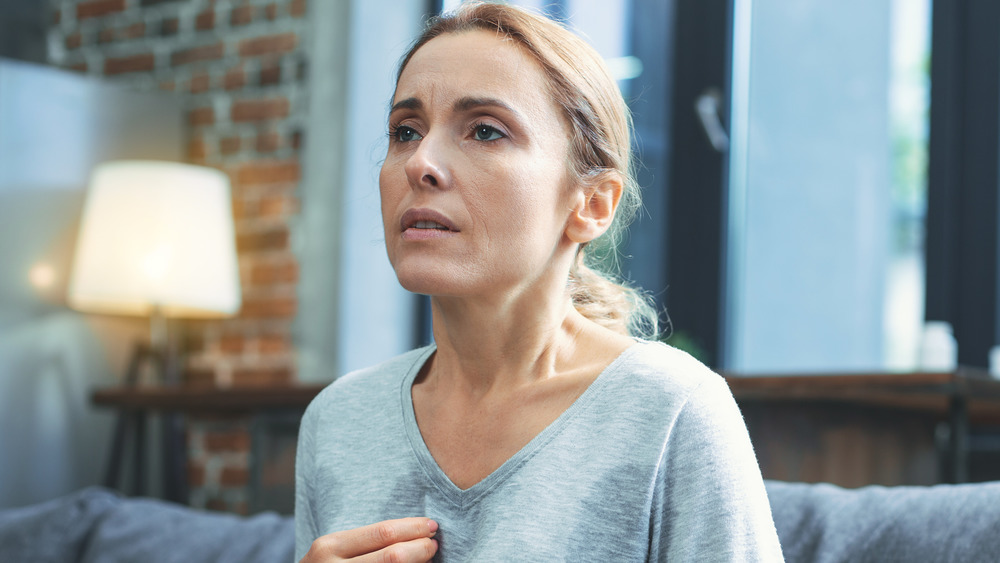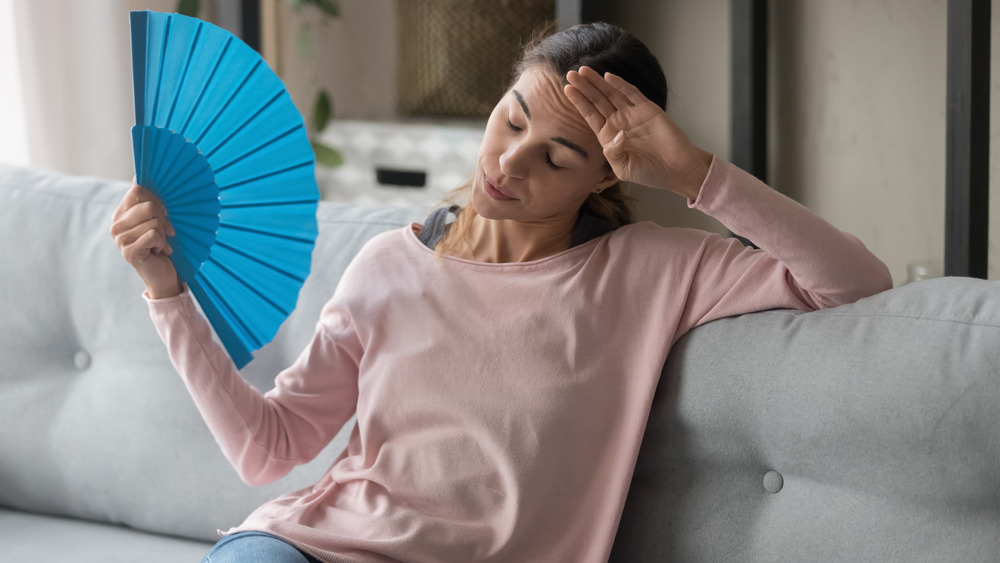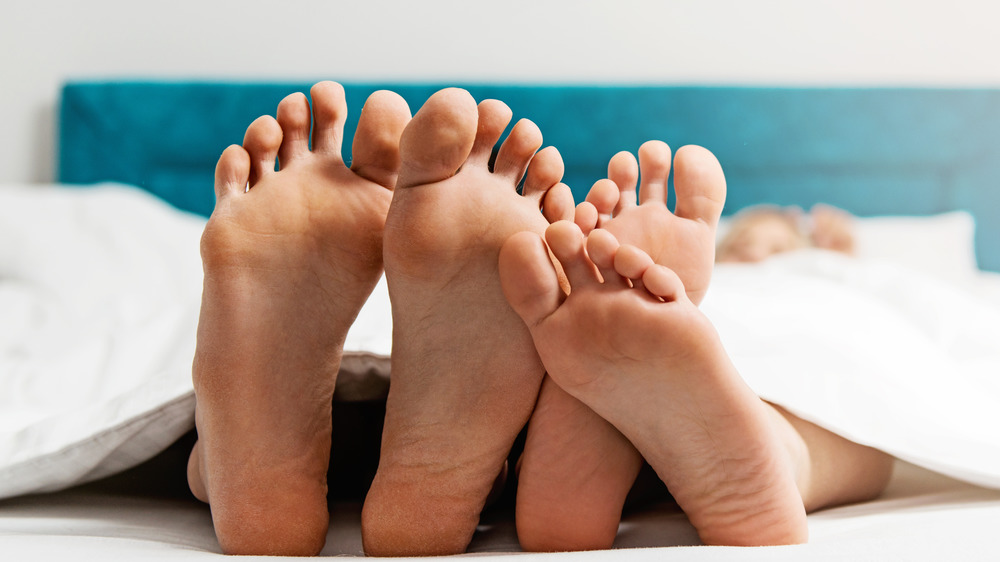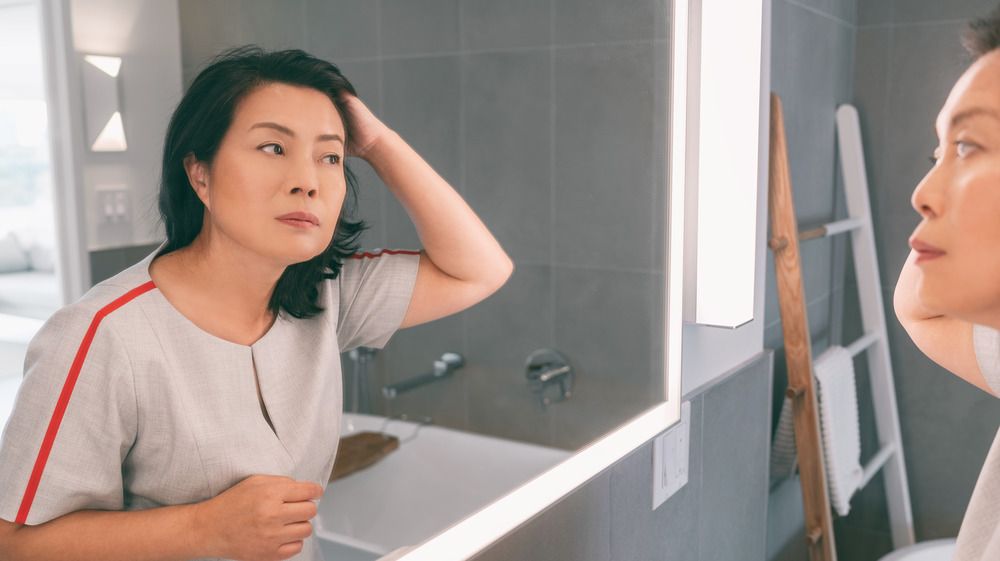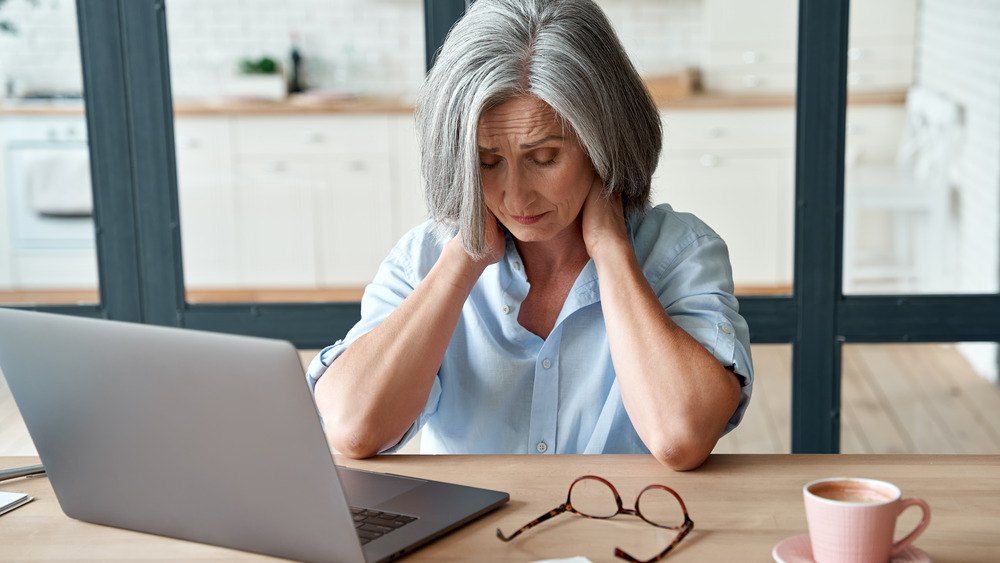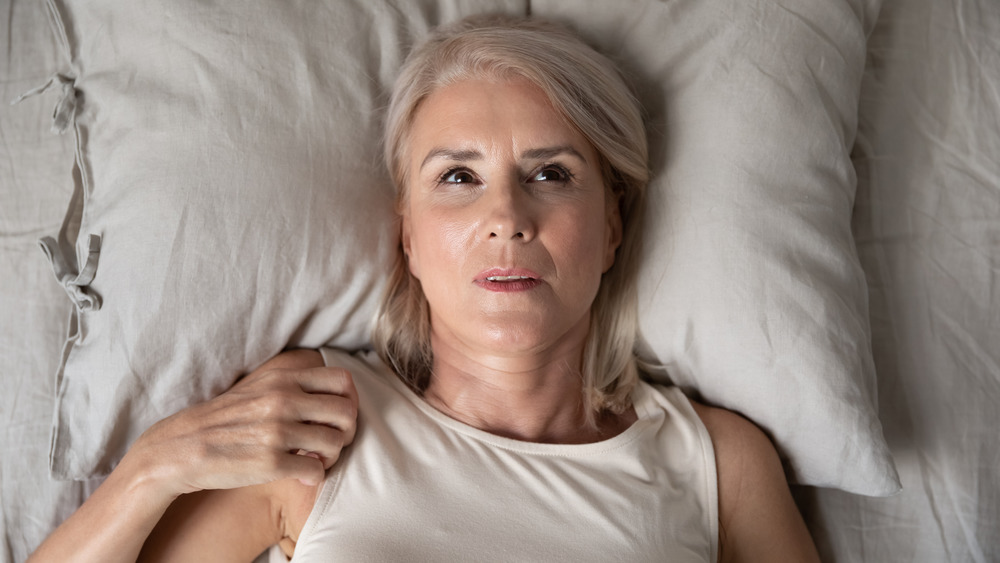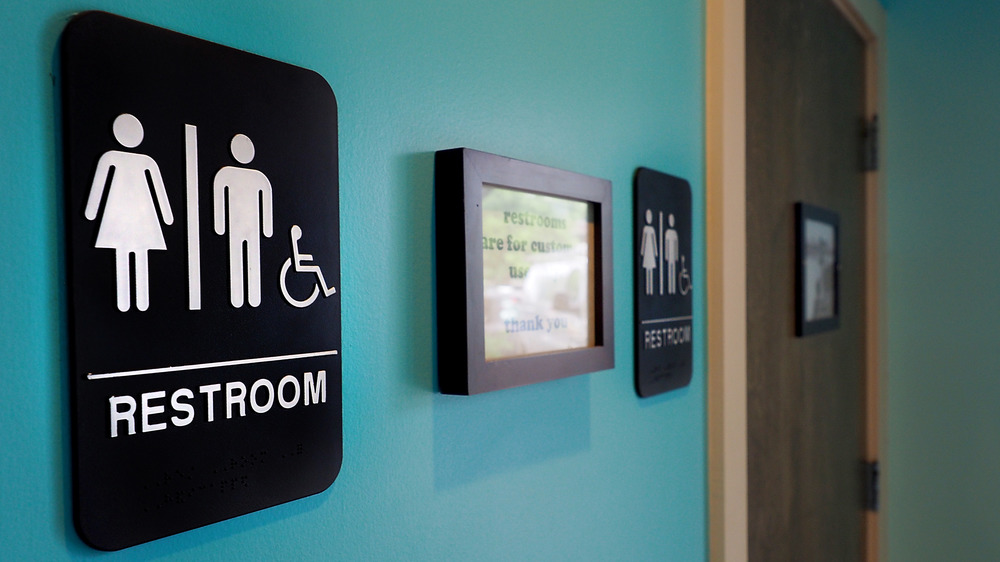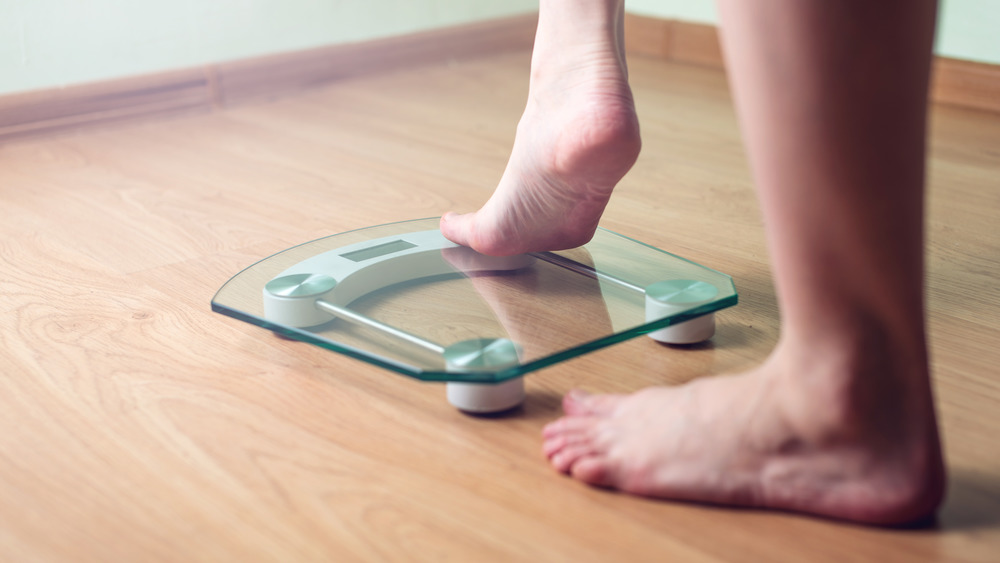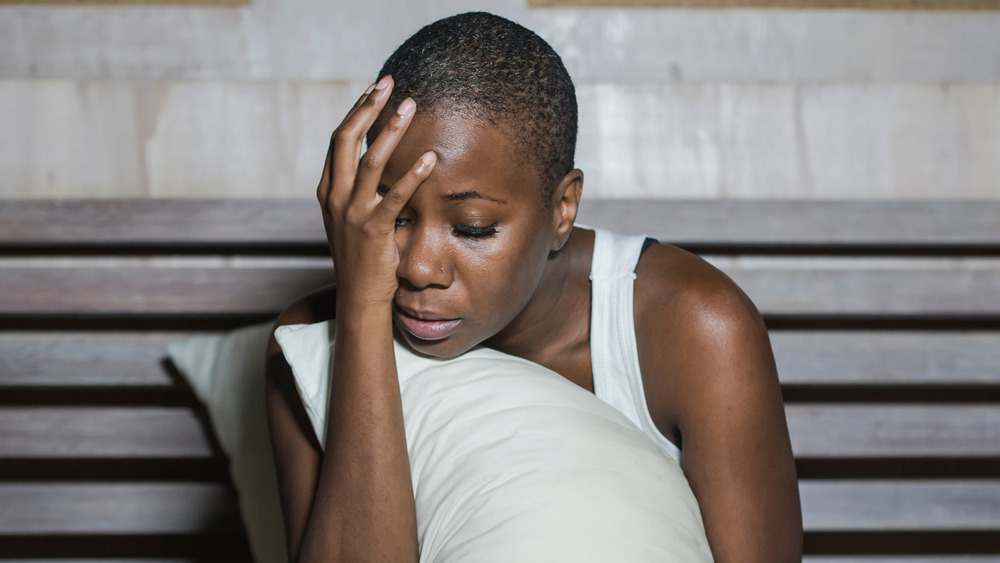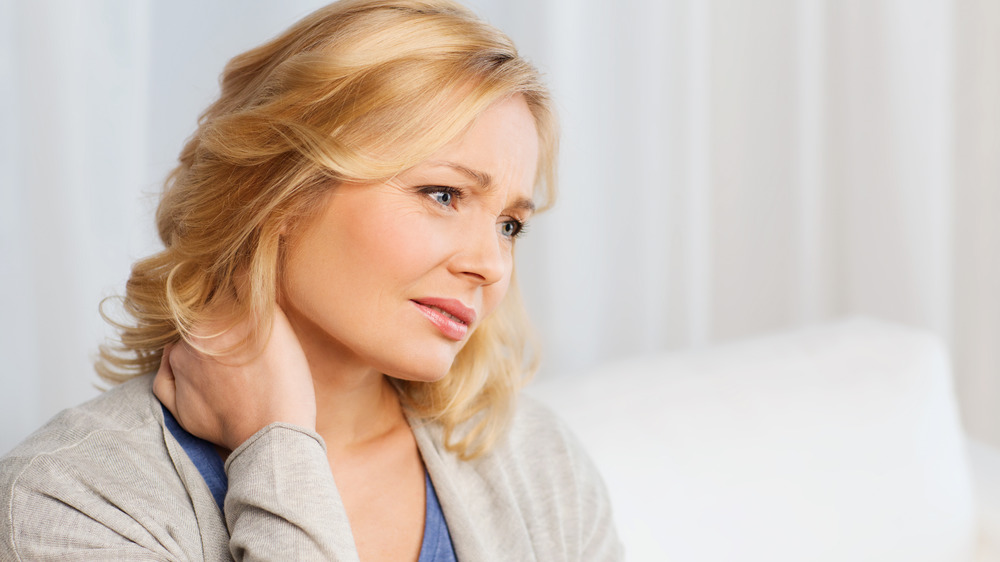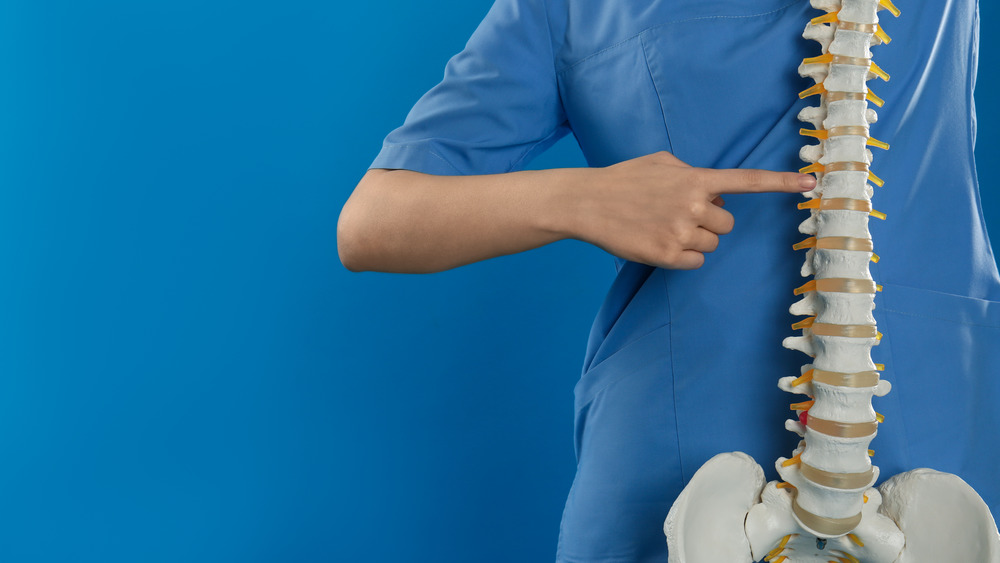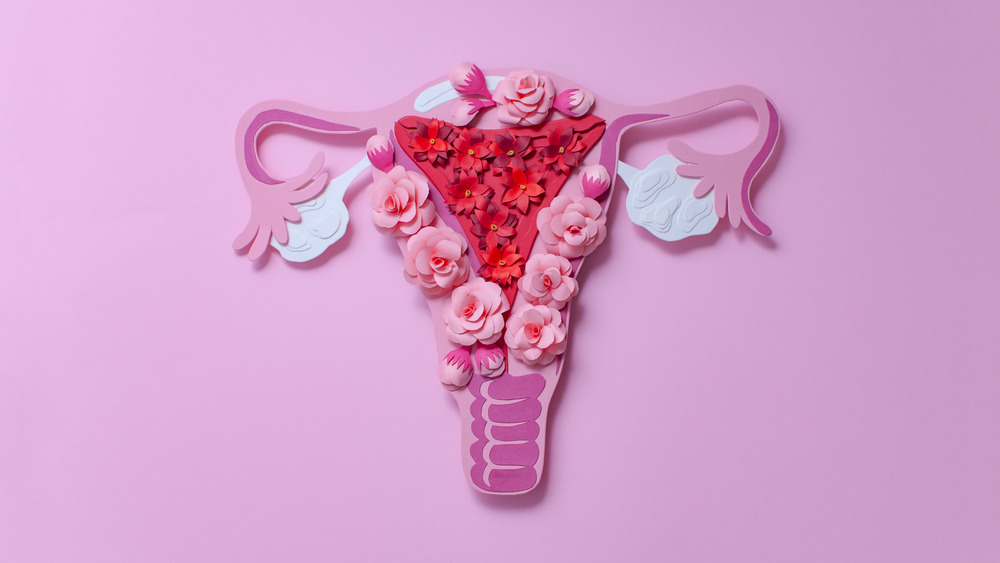When You Go Through Menopause, This Is What Happens To Your Body
When you go through menopause, what happens to your body? If you're a person who's spent a good portion of your life with a menstrual cycle, chances are at some point you're going to go through this significant hormonal change. And while some people might just stop menstruating, most of us will have some, if not several, side effects as our bodies shed the ability to reproduce (via the Cleveland Clinic). For some, the change may be bittersweet, reminding them of their children, but also that they'll have no more as they grow older. But for others, it will be a joyous occasion, as fertility was never a concern for them.
So how much do you know about menopause? Perhaps you learned about it when your mother went through it, which gave you a good idea of what to expect. But given that everyone's body is different, there may be more you need to know about venturing through this rite of passage. To that end, when you go through menopause, this is what happens to your body.
When you go through menopause, you may have hot flashes
One of the most common and well-known side effects of menopause is hot flashes, as noted by Healthline. In a nutshell, a hot flash is when there's a sudden spike in your temperature, which can make you feel flushed, as well as red in the face. So why exactly is that happening to your body? "The fall in estrogen and menopause triggers a response with your blood vessels that contribute to the hot flashes," OB/GYN Dr. Tara Scott told The List. "They could also manifest as night sweats or just noticing you feel hot all the time and can't wear a turtleneck anymore."
It's not just the shift in hormones that provokes hot flashes; rather, it's the change in your hormone levels and their ratio to one another, says Scott. "Estradiol, produced when you are ovulating, must be in balance with progesterone," she continued.
Depending on the severity of your hot flashes, there are several treatments available, according to the Mayo Clinic. One is to take estrogen, and another is to take an antidepressant, which can lessen symptoms. But we won't judge you for hugging a fan, either.
Intercourse may become more painful
One of the most important things you need to know about menopause is that there are sexual side effects. That's a reality that just might happen to your body, as noted by clinical sexologist Dr. Ditza Katz. "You are entering a new phase when your physical, emotional, and sexual health changes," she explained to The List. "Your vagina becomes less elastic and more prone to chafing irritation, making intercourse painful." You may also experience vaginal dryness, according to the Mayo Clinic, one of the menopause symptoms that no one prepares you for. That... doesn't sound pleasant, especially if you have an active intimate life.
Fortunately, Katz says that you're not necessarily resigned to a fate of celibacy if you don't want to be. "Don't let it go," she continued. "Sexual intimacy is important, and there are solutions." And those solutions include moisturizers, lubricant, suppositories, and estrogen pills or creams. Additionally, regular intimate activity — with someone else or even by yourself — can keep your vagina happy and healthy as well.
Your libido may increase or decrease when you go through menopause
As you're probably already aware, the hormones in your body are responsible for how much or how little you crave intimacy, as noted by Medical News Today. It's not surprising, then, that going through menopause will have an impact on your libido, according to OB/GYN Dr. Alyssa Dweck, INTIMINA's Sexual and Reproductive Health expert. "Hormones including estrogen, progesterone and testosterone are variable during the peri-menopausal years and plummet with menopause," she shared with The List. "Although libido is complicated for women, these hormones are incredibly influential."
While this hormonal flux can result in a decreased libido in later stages of menopause, Dweck says that in earlier stages, you might find yourself especially randy. "While this is not universal, many women experience heightened sexual drive during the peri-menopausal years, the four to eight years prior to menopause which is by definition, 12 consecutive months of no menses," she continued. "During this time, reproductive potential is winding down." And that's also when the baby fever might set in, so be aware of that and plan accordingly.
Your skin may change when you go through menopause
The hormonal changes that happen in your body when you go through menopause don't just have an impact on your libido. Rather, they can also have significant impacts on your skin, according to OB/GYN Dr. Kim Langdon, a medical advisor for Medzino. You may develop "skin wrinkles due to loss of estrogen — that leads to loss of collagen," she told The List. And that "loss of collagen and blood vessels can cause the skin to thin out, which leads to irritation." This can also cause your breasts to sag, so make sure you have good bras in your drawer to cope with that.
That's not the end of the story when it comes to your skin, unfortunately, as Langdon says you may want to keep the lotion nearby. That's because going through menopause can cause "dry skin, again due to lack of estrogen and loss of collagen and oil production," she continued. Plus, you might also find "hair growth in unwanted places like the upper lip, chin, and lateral cheeks." Okay, we're really not excited about these changes!
You may feel more tired
According to CNBC, working mothers are still doing most of the chores at home, so it's no wonder so many of us are so exhausted. But if you're already feeling tired, when you go through menopause you may feel even more so, as noted by OB/GYN Dr. Tara Scott. "First, the fall in estrogen does cause a decrease in energy," she explained to The List. "Next, the fall in androgens — DHEA and testosterone — also influence your energy." And that alone can cause you to drag during the day.
There's another factor at play when it comes to menopause and exhaustion, as noted by Scott. "Also, estrogen and progesterone have an affect on your thyroid, so that could also contribute," she added. That's all the more reason to take a nap, as that might help you feel more energetic (via the Mayo Clinic). Of course, talk to your doctor if you're really struggling.
When you go through menopause, you may suffer from insomnia
Speaking of feeling tired, according to the CDC, one in three American adults aren't getting enough sleep at night, which is seven or more hours a night. Unfortunately, your beauty sleep might get interrupted more when you go through menopause, says immunologist Dr. Lina Velikova. "Women in menopause might experience sleeping problems due to hormonal changes that happen during these times," she revealed to The List. "Hot flashes and night sweats are frequently impossible to manage during night time, and they can cause disturbed sleep, which can further down spiral into every aspect of a woman's life."
While reaching for an extra cup of coffee might help you fight the Zs during the day, it's still important try to get as best of a night's rest as possible. According to Healthline, some ways you can do just that are tinkering with your light exposure, managing your caffeine consumption, taking a melatonin supplement, and being mindful of what you eat and drink.
When you go through menopause, your restroom habits may change
If you've never been pregnant, you might not think about your pelvic floor very often. But this hammock of muscles inside of your pelvis supports some important organs, such as your uterus, your bladder, and your colon, as noted by Healthline. For this reason, having a healthy pelvic floor is super important.
However, when you go through menopause, that can impact your restroom habits, according Dr. Rachel Gelman, INTIMINA's Pelvic Floor Health Expert. "Hormonal changes during menopause can impact pelvic floor muscles leading to things like urinary/fecal incontinence and pelvic organ prolapse," she explained to The List.
So in order to keep your pelvic floor strong and healthy, Gelman recommends getting regular exercise. "Since these muscles are supporting the pelvic organs, and providing core stability, any type of exercise will engage the pelvic floor in some way," she continued. "So low impact cardio can be a good start." She also recommends not straining when you have a bowel movement and using a Squatty Potty if needed. That can help you out a lot in the long run.
You may gain weight during menopause
Some of us are lucky enough to eat anything that we want and never gain unwanted pounds. Those unicorns aside, the rest of us definitely notice when we've put on a little weight simply by looking at food. Well, no matter which group you belong to, you may find your metabolism changing as you go through menopause, according to immunologist Dr. Lina Velikova. "Many women experience weight gain during menopause due to hormone changes and as a consequence of aging," she revealed to The List. Yep, even on top of everything else, gaining weight will be easier than ever.
Fortunately, Velikova says that you might not have to buy a bigger pair of jeans after all. "However, weight gain is avoidable even in this period," she continued. "You'll have to put some extra effort into keeping it in check." That, of course, means you'll have to adjust your diet and exercise regimen in order to stave off the pounds.
You may feel more anxious or depressed
Mental illness is on the rise in the United States, as noted by the CDC. In June of 2020, 31 percent of American adults reported feeling of anxiety and depression, which is a pretty staggering number. And unfortunately, if you're going through menopause, that could be one of the causes. "Life circumstances and stress during the menopause years and general aging might contribute to feelings of anxiety or depression," OB/GYN Dr. Alyssa Dweck shared with The List. "Heart palpitations are a common complaint associated with both hot flashes and of anxiety." So even if you've never struggled with these conditions, menopause may make you more likely to.
If you already have a mental health diagnosis, going through menopause is something to be concerned about, says Dweck. "In addition, those with underlying depression might note a worsening of symptoms during menopause," she added. If you're concerned you may be experiencing this, talk to your doctor.
If you or anyone you know is having suicidal thoughts, please call the National Suicide Prevention Lifeline at 1-800-273-TALK (8255).
You may experience mood swings when you go through menopause
It's not just anxiety and/or depression that you may have to contend with during menopause when it comes to your mental health, according to immunologist Dr. Lina Velikova. "Mood swings are a pretty common and pretty normal side effect of menopause," she explained to The List. "During menopause, women's bodies experience a decrease in estrogen levels and more serotonin which should increase mood." Hey, having a little extra serotonin sounds like a pretty nice benefit! After all, serotonin can make you happier and help with your concentration and anxiety, as noted by Healthline.
Still, there are other factors at play that can take your emotions on a bit of a rollercoaster ride during menopause, says Velikova. "However, other side effects of menopause such as fatigue, irritability, and depression make it harder to be upbeat every day and make mood swings a regular part of the day," she continued. It is what it is, fam.
When you go through menopause, you may feel ill
The hits keep coming. Yet another thing you may have to deal with when you go through menopause is feeling ill. And while you're not likely to contend with anything too severe, as you may have in the past with morning sickness, thanks to shifting hormone levels, things could get unpleasant. "Your energy is related to the amount of hormones you have," OB/GYN Dr. Tara Scott told The List. "With the decrease in estrogen and progesterone, and also testosterone at menopause, you may experience joint and muscle aches, fatigue, and brain fog."
Fortunately, there are some things you can do to keep these symptoms in check, as noted by Healthline. For muscle aches, you can take NSAIDs to mute the pain, as well as ice the area to help any swelling go down. You can also do some gentle stretches like yoga, which can bring you relief as well. Your mileage may vary.
Your vision may change
Another thing that's connected to the hormone levels in your body is your eyesight. In fact, according to the The North American Menopause Society, that's why you experience changes to your eye health during parts of your menstrual cycle as well as when you're pregnant.
Given that fact, it's not surprising that you may find yourself having ocular issues when you're going through menopause. According to OB/GYN Dr. Kim Langdon, "eye and/or vision changes, including dry eyes" are possible during menopause, as she explained to The List. That can also include "difficulty reading, but generally maintaining the ability to see at a distance." Even the shape of your eyes might change a bit, which can make contact lenses less comfortable.
It order to make sure your baby blues stay healthy as you age, talk to your doctor. She can tell you about the various eye drops that are available, as well as surgical procedures to treat dry eye. And if you find your vision changing, it may be time to hit up the drug store for some reading glasses.
When you go through menopause, your bones may become more fragile
The importance of bone health can't be overstated. That's probably why your parents told you to drink your milk so much when you were younger, as the calcium found in milk helps your bones grow strong, as noted by Harvard University.
Additionally, when you go through menopause, it's as important as ever to prioritize your bone health, says immunologist Dr. Lina Velikova. "Women during and after menopause are at risk of osteoporosis since low estrogen levels coupled with the consequences of aging decrease the bone mass, making them break down faster," she told The List. And that can make bone injuries much easier to sustain.
In order to preserve your bone health in menopause and beyond, The North American Menopause Society recommends that you get enough calcium and vitamin D, as well as avoid drinking alcohol and smoking. Additionally, regular exercise at least a few days per week is also encouraged.
You'll eventually stop menstruating
The reason that people have a menstrual cycle to begin with is to prepare the body for pregnancy, as noted by Healthline. When you bleed once per month, that's the body expelling the lining of the uterus if no egg is implanted inside of it.
To that end, when you go through menopause, your body stops preparing for pregnancy, according to OB/GYN Dr. Alyssa Dweck. "Eventually ovulation ceases for all women, and thus estrogen levels decline and no longer produce a thick, lush lining of tissue in the uterus to prepare for pregnancy," she shared with The List. "Menstruation will naturally stop ... for this reason."
While menopause may be a difficult time for some, for many people it can be a relief, as you no longer need to buy menstrual products and won't struggle with menstrual-related problems. And while there's a lot about menopause that's difficult, OB/GYN Dr. Christiane Northrup says it has its perks. "You become far more intuitive, you are no longer satisfied with the status quo, and you find your voice in a different way," she wrote in The Secret Pleasures of Menopause (via WebMD). We're here for it!
